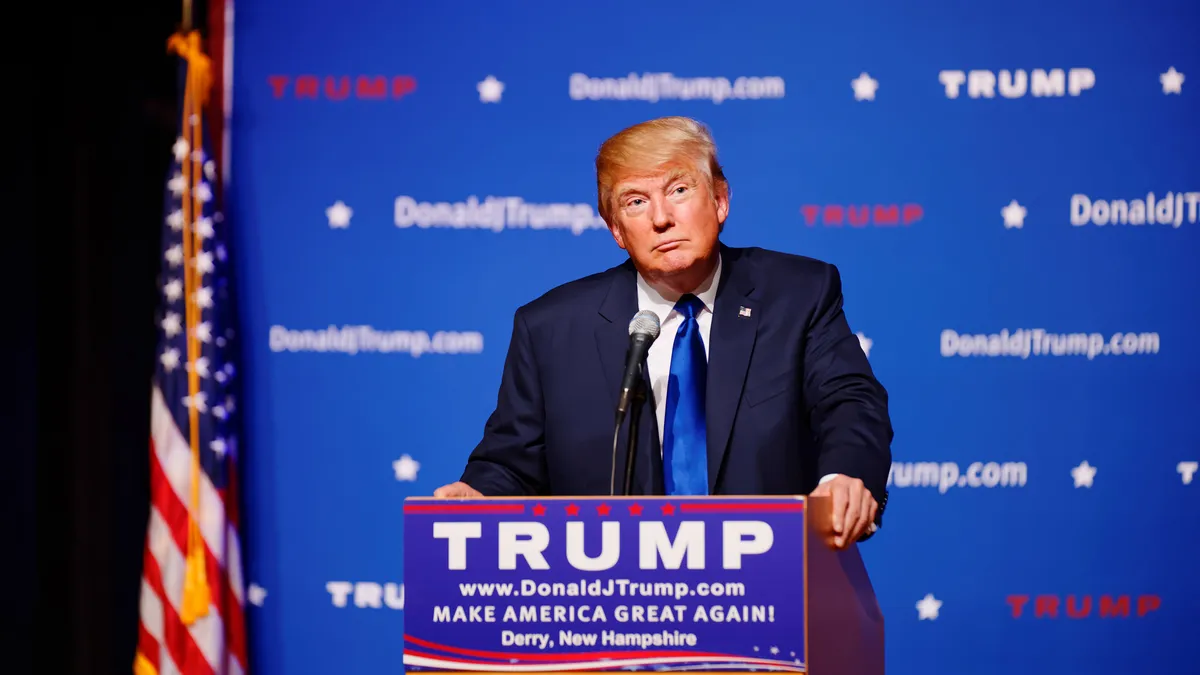Dive Brief:
- Donald Trump, the presumptive Republican presidential nominee, outlined his energy policy proposals at an oil industry conference in North Dakota on Thursday, promising to expand fossil fuel use and reduce environmental regulations.
- The nearly 45-minute speech hit on many long-held Republican priorities, including rescinding EPA air pollution regulations, opposing international environmental accords and supporting the coal and oil industries.
- Trump's support for fossil fuels contrasted with comments on renewables. He claimed solar energy is "very, very expensive," and that wind energy is "killing all the eagles" and "doesn't work" without subsidies.
Dive Insight:
In his first 100 days in office, Trump vowed to "rescind" EPA regulations including the Clean Power Plan, which aims to cut carbon emissions from the power sector 32% by 2030. He would also "cancel" the Paris climate accord, signed by governments of more than 190 countries last year.
“Regulations that shut down hundreds of coal-fired power plants and block the construction of new ones — how stupid is that?” Trump said.
The next president will not have unilateral authority to rescind the CPP, the New York Times points out, but if elected Trump could nominate a Supreme Court justice who could help overturn the rules. The regulations are headed for a hearing of the full D.C. Circuit Court in September, and it is unlikely the Supreme Court will take up and rule on the carbon plan before the end of President Obama's term.
More consequential could be Trump's promise to undo the Paris climate agreement. U.S. domestic action on greenhouse gas emissions, coupled with aggressive diplomacy from the Obama administration, were critical in securing the package of voluntary goals that aim to keep global warming under 2°C.
“This agreement gives foreign bureaucrats control over how much energy we use on our land, in our country," Trump said, inaccurately. "No way.”
While a U.S. president could not unilaterally "cancel" the climate accord, as Trump promised, lackluster climate policy from the United States could influence how other major polluting nations — particularly India and China — implement the landmark agreement.
Despite claiming he is "into all kinds of energy," the presumptive GOP nominee had some harsh words for wind and solar in a question and answer session.
"I know a lot about solar," he said. "The problem with solar: It's very expensive. When you have a 30-year payback, that's not exactly the greatest thing in the world. But I know a lot about solar. I have gone solar on occasion, but it is a very, very expensive thing."
"Wind is very expensive," Trump added. "I mean, wind, without subsidy, wind doesn't work. You need massive subsidies for wind. There are places maybe for wind. But if you go to various places in California, wind is killing all of the eagles."
The prices for solar and wind generation, in fact, have fallen precipitously in recent years and are competitive with traditional generation resources in growing regions around the country.
In the West and Southwest, utility-scale solar contracts are going for $40/MWh or less, and wind generation in the Midwest is competitive with natural gas, despite historically low prices for the fuel.
Last year, Bloomberg New Energy Finance reported that wind, including subsidies, "became the cheapest electricity in the U.S. for the first time," and that solar, while "a bit further behind," is declining rapidly in cost. The fossil fuel industry also receives billions in government subsidies annually.
While the subject has garnered media attention, avian deaths due to wind and solar facilities have been shown to be far lower than those caused by fossil fuel extraction and power generation.













